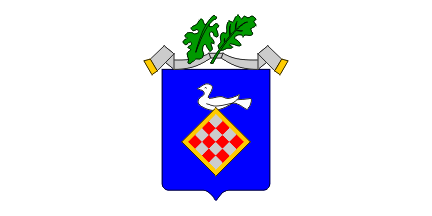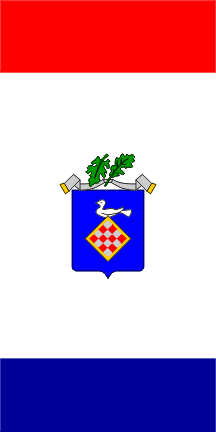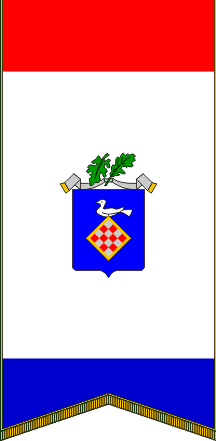
image by Željko Heimer

Last modified: 2009-07-26 by dov gutterman
Keywords: sisak | croatia | sisacko-moslavacka | kutina |
Links: FOTW homepage |
search |
disclaimer and copyright |
write us |
mirrors
See also:
Other sites:
The coat of arms is blue with a 4x4 red and white chequy plate
rotated 45 degrees surmounted by a white bird (dove?). In the
crest there is white scarf with golden fringe and two oak leaves.
The flag, is white with the coat of arms in the middle. The table
flag contains the name of the city inscribed under the downward
offset coat of arms. Adopted: around 1998 (?).
Source: Table flag of Kutina, ca. 1998, author's collection.
Željko Heimer
Kutina is a city in Sisak-Moslavina County probably most well
know for the petrochemical industry situated there. The coat of
arms is blue with a golden bordered 4x4 red and white chequy
plate rotated 45 degrees surmounted by a silver magpie. In the
crest there is white scarf with golden fringe and two oak leaves.
The flag, is white with the coat of arms in the middle. The table
flag contains the name of the city inscribed under the downward
offset coat of arms. Kutina bears the arms of their medieval
lords Csupor de Monoszlo (C<upor Moslavac<ki), whose most
prominent member was Demetrius II Csupor de Monoszlo, installed
in 1446 for the bishop in Knin. The coat of arms of Csupor family
is known already in 14th century. Until the end of 15th century
the family died out and thier estates were eventually inherited
by Erdödy family that beared their second attribute de Monoszlo.
The magpie is said to symbolize labor towards richness. (Actually
only the shield of Csupors is used with changed crest, but going
into those details would lead us to far. Erdödy family was
important family in many other parts of Croatia (and Hungary),
and their arms are reflected in moders symbols thoughout the
region, just to mentioned Varazdin County and issuant deer from a
wheel)
Source: I. Bojnicic: Der Adler von Kroatien und
Slavonien, Nuenberg 1899, reprint Golden Marketing, Zagreb 1995.
Željko Heimer, 14 December 2002
The web
site of the city shows the city symbols. Although it uses my
drawings of the coat of arms and the flag, the text seems to be
independant.
At the end of the base are added paragraphs on the new visual
identity, but this regards logos and like and does not change
flags.
It also describes the tricolour version of
the Kutina flag.
Željko Heimer, 13 December 2008

outdoors flag (?)
image by Željko Heimer

indoors flag (?)
image by Željko Heimer
sk!kt.gif)
coat of arms
image by Željko Heimer
The previously reported flag is probably a proposal, latter
adopted to conform with the national regulations regarding the
municipal symbols. The coat of arms was with a purpure field,
porbably chnaged since purpure is not among the allowed colours
in regulations for coat of arms. The flag, recorded only
vertically, had red stripe near hoist, which was removed,
presumably to conform the requirement that the civic flags should
be of monocoloured fields.
Source: Flag shown on TV report from Kutina, 1998. Design
unconfirmed, flag colours unconfirmed. Coat of arms according to
<www.petrokemija.tel.hr>,
14. 9. 2000.
Željko Heimer
Regarding the previously used flag in mid-1990's, I have
received new info that corrects it - as I said back then, the
exact design was uncertain. Namely the photo I got from 1998 did
not show the fly (i.e. lower part of a vertical flag).
In the mean time I recevied further photos (Photo from opening of
10th wine exhibition Kutina, 22-27.05.2002, flags used on the
City Assembly Building in Kutina on <www.kutina.hr>.
about the same time.) show the flag red-white-blue, with the
large white stripe.
Željko Heimer, 29 June 2004
The web
site of the city describes the tricolour version of the
Kutina flag: It has red stripe in upper edge and blue in the
lower, each covering one sixth of the length, and the coat of
arms set in the middle of the central white stripe. The flag is
also described to have a triangular indentation at the fly end
and should be edged with yellow around the outer edges and should
have yellow fringe along the fly end. This was probably used only
for indoors flags.
Željko Heimer, 13 December 2008